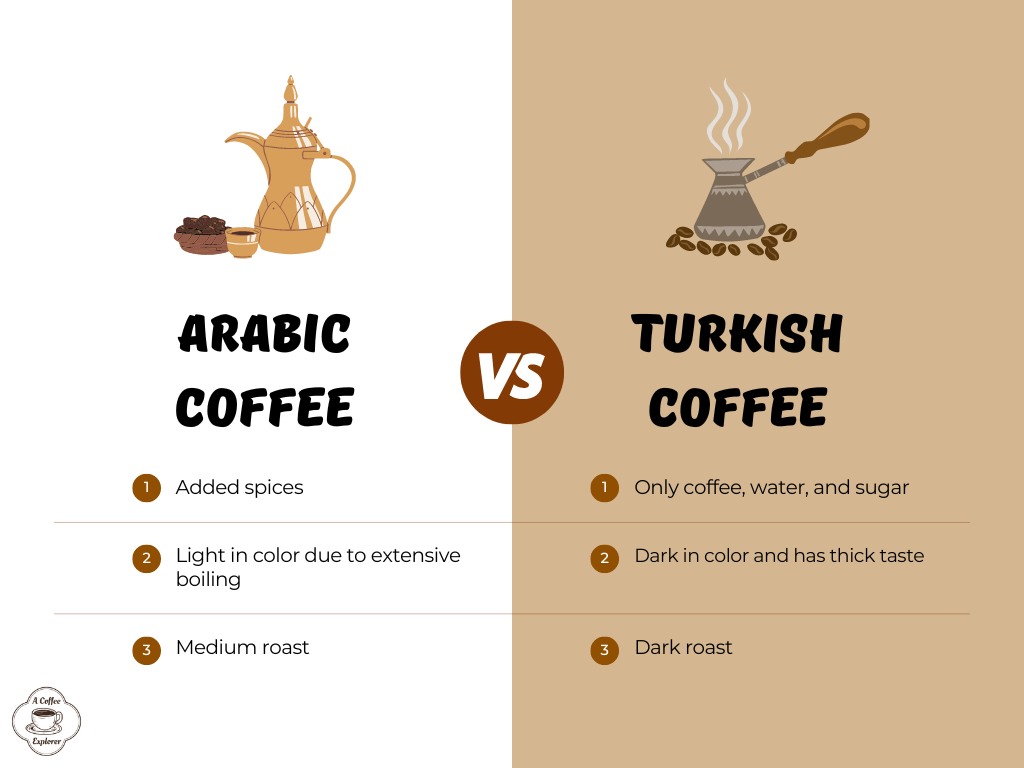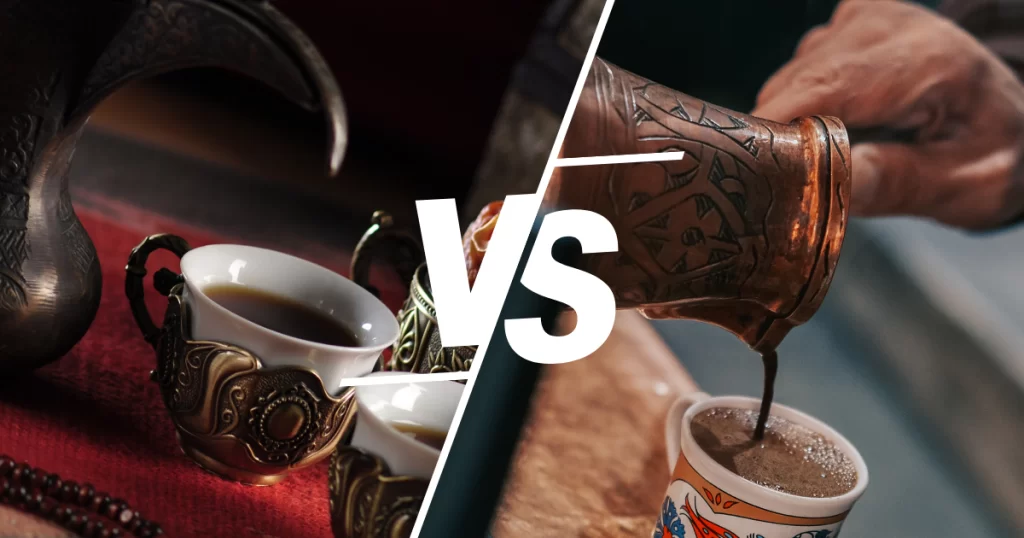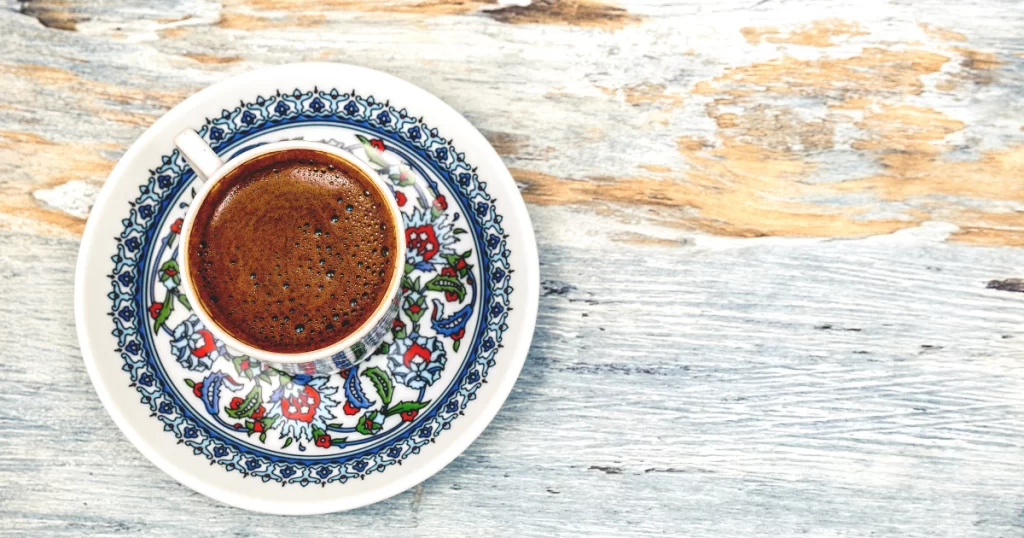When it comes to discussing the difference between Arabic and Turkish coffee, the most obvious difference is the preparation method. Additionally, Arabic coffee often includes different spices for flavoring.
Another key differentiator between these two types of coffee is their taste profile. Turkish coffee is known for its bold flavor, while Arabic coffee tends to be much milder in comparison, with little to no bitterness, focusing more on spices rather than caffeine content.
To better understand the differences between Arabic and Turkish coffee, we need to compare all these elements side by side.
If you wish to delve into the differences that define Turkish coffee, this article is for you.
The ultimate comparison: Arabic Coffee vs Turkish coffee
Even if some people may say Arabic Coffee and Turkish coffee are the same, there are plenty of distinctions that make each beverage unique.
Roast levels
Arabic coffee is typically lighter roasted than Turkish coffee. This results in a milder flavor and a more subtle taste overall.
In contrast, Turkish coffee is heavily roasted, which gives it a strong and bold flavor profile. Some people might argue that the heavily roasted nature of Turkish coffee is what makes it so delicious.
The lighter roast of Arabic coffee results in a much lighter color of the coffee beans once they are ground.
Preparation methods
Turkish coffee typically requires a special pot known as a cezve or ibrik, which is used to boil the finely ground coffee beans and water together.
On the other hand, Arabic coffee is brewed using a traditional dallah pot that has been specifically designed for this purpose. The process involves boiling water with lightly roasted coffee beans and then boiling spices such as cardamom, cloves, and saffron in a dallah pot.
Another important difference lies in the preparation time. You can make Turkish coffee in 2 to 5 minutes, while Arabic coffee requires more time, usually over 20 minutes.
Taste difference
Arabic coffee taste is often described as bitter and fruity, with hints of chocolate, caramel, and nuts.
Turkish coffee, on the other hand, has a bold, strong, and bitter taste than its Arabic counterpart.
In terms of texture, Turkish coffee is known for being thick and foamy, with a creamy mouthfeel. Meanwhile, Arabica coffee tends to be thinner in texture but still retains its bold flavor profile.
Visual difference
Arabic coffee is typically lighter in color, it almost looks like clear yellow soup. On the other hand, Turkish coffee is dark and easily recognized thanks to the unique foam on the top.

What spices does Arabic coffee use?
Unlike Turkish coffee, which is generally prepared with only water and coffee grounds, Arabic coffee utilizes a unique blend of spices to create its distinct flavor.
The most common spices used are cardamom, saffron, and mastic. These spices aren’t simply thrown in haphazardly; rather, they are carefully selected and measured to create a perfectly balanced flavor profile.
What is the history of Arabic and Turkish coffee?
It is widely believed that coffee was first cultivated in Yemen. According to legend, an Ethiopian named Kaldi one day noticed goats acting differently after eating berries from a certain plant. He brought the berries to the head monk of the nearest village, who deemed them as “Devil’s work” and threw them into the fire.
The fire really did the magic, and today’s well-known smell of roasted coffee encouraged the head monk to spill the water over the beans. That is how they made the first cup of coffee.
From there, he spread his newfound knowledge of these “magical” beans throughout Arabia. Turkish coffee also has deep roots in history, dating back to the Ottoman Empire.
The Ottomans were known for their love of strong black coffee served with sweets like Turkish delight or baklava. It was considered a luxury drink enjoyed only by royalty and wealthy citizens until it became popularized among commoners as well.
Want to know what is the difference between Turkish coffee and espresso? We’ve got it covered here.
Conclusion
Arabic and Turkish coffee are both unique, flavorful, and culturally significant beverages. It is a symbol of hospitality and generosity both in Arab and Turkish communities.
Overall, while both types of coffee have their strengths and weaknesses, I would highly recommend that you try both types and decide for yourself which one suits you the most. Either way, you won’t be diamonded.
My journey through renowned bars and coffee shops over five years, as a barista, coffee aficionado, and former bartender, has honed my pursuit for the perfect cup. My passion for coffee isn’t just about the brew—it’s about sharing the knowledge and insights I’ve gleaned along the way.



